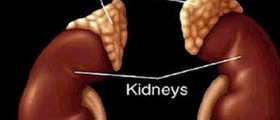
The endocrine system consists of glands that produce hormones and are in charge of many important functions of the body. The endocrine glands regulate different life processes by efficient coordination between them. Hormones secreted by these glands are chemical messengers that transfer information from one part of the body to another. The glands release hormones directly into the blood stream from which they travel to different body parts.
Glands of the Endocrine System
The endocrine system is made up of six major glands. They include: hypothalamus, pituitary gland, adrenal gland, thyroid gland, pineal gland and reproductive glands or gonads (ovaries and testes). The hypothalamus is located in the lower central part of the brain which regulates metabolism and body temperature.
Hypothalamus
The hypothalamus is the main link between the nervous and endocrine systems. This gland secretes hormones that regulate hormone secretions of the pituitary gland.
Pituitary Gland
The pituitary gland is situated below the hypothalamus, at the base of the brain and it is no larger than pea. It is considered the most important gland of the endocrine system because it secretes hormones that control some other endocrine glands.
Thyroid Gland
The thyroid gland is a butterfly-shaped organ, located in the front part of the lower neck. This gland secretes hormones such as thyroxine and triiodothyronine. The thyroid gland hormones regulate the body’s metabolism. In children, these hormones have a role in bone growth and development of the brain and the nervous system. The parathyroids are four tiny glands attached to the thyroid gland. These glands regulate the level of calcium in the blood.
Adrenal Glands
The adrenal glands include two glands that are located on the top of each kidney. These glands are triangular-shaped organs that are made up of two parts. The outer part is called the adrenal cortex and the inner part is known as adrenal medulla. The adrenal glands secrete hormones that assist the body to deal with the stress by increasing blood pressure and heart rate. These hormones also maintain the salt and water balance in the body.
Pancreas
The pancreas is the organ with both digestive and hormonal functions. It is a double gland that produces two important hormones that include insulin and glucagon. These hormones control the blood sugar level in the body. Decreased production of insulin leads to diabetes.
Reproductive Glands
The reproductive glands or gonads are the main source of the sex hormones. The reproductive glands in males are testes, located in the scrotum, which secrete hormones known as androgens that include testosterone. In females, these glands are the ovaries that produce hormones estrogen and progesterone.
Pineal Gland
The pineal gland is located in the middle of the brain. This gland produces hormone melatonin that regulates the wake and sleep cycle in the body.
















Your thoughts on this
Loading...